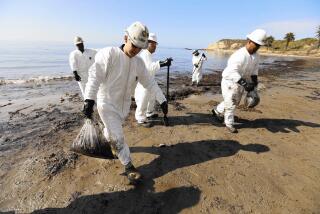State Dept.: Minimal environmental impact from Keystone pipeline

- Share via
WASHINGTON – The State Department issued a long-awaited environmental review of the controversial Keystone XL oil pipeline that concludes it would have a minimal impact on the environment, increasing the chances that the project might be approved in the coming months.
The State Department underscored that the supplemental environmental impact statement is only a draft and does not offer recommendations for action on the $7-billion project, which would bring petroleum from the oil sands of Alberta, Canada, to refineries on the Gulf Coast of Texas. Nonetheless, the review says “the analyses of potential impacts associated with construction and normal operation of the proposed project suggest that there would be no significant impacts to most resources along the proposed project route.”
Because Keystone XL crosses a U.S. border, it needs a permit from the State Department. A decision on the permit was originally expected in late 2011 but was delayed until after the 2012 presidential election, in part because of widely held concerns that the original environmental impact statement did not adequately assess the pipeline’s impact on the greenhouse gas emissions that feed climate change or on a huge aquifer in its path in Nebraska.
The oil industry and the Canadian government welcomed the review’s findings.
“The environmental impact statement released today is long overdue, and continues to build a strong case supporting the construction of the Keystone XL pipeline,” said Karen Harbert, president of the U.S. Chamber of Commerce’s Institute for 21st Century Energy. “The Keystone XL project has become one of the most closely examined infrastructure projects in our nation’s history — and it continues to pass with flying colors.”
Environmentalists and their allies decried the study, saying that it failed to look fully at the risks associated with the project and instead regurgitated past conclusions.
“What we have is Groundhog Day, with the State Department producing the same result that it produced before,” said Bill McKibben, founder of 350.org, an environmental group leading the fight against the pipeline.
More to Read
Get the L.A. Times Politics newsletter
Deeply reported insights into legislation, politics and policy from Sacramento, Washington and beyond. In your inbox twice per week.
You may occasionally receive promotional content from the Los Angeles Times.











